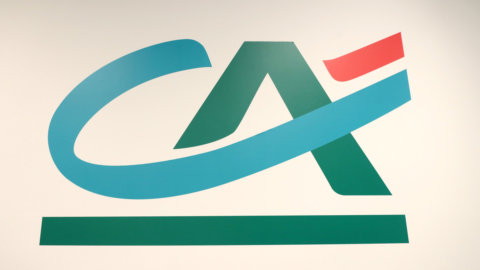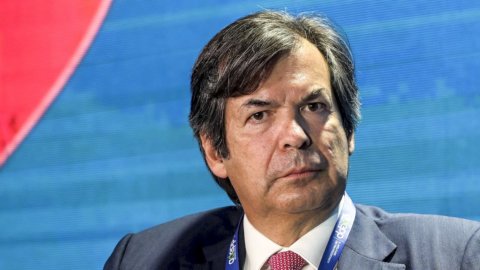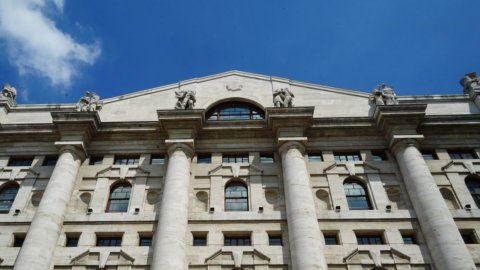The markets are faltering, hit by the no-holds-barred clash between the two giants. The United States, faced with the fall of the yuan below the dollar threshold, has announced the appeal to the International Monetary Fund against unfair competition from Beijing. China, hit yesterday by new tariffs on goods to the US, accuses Washington of "deliberately wanting to destroy world order". The Stock Exchanges, in the face of the worsening crisis, are under no illusions: after all, it is difficult to be optimistic in the face of a very high-tension geopolitical scenario, from the crisis in Kashmir to the strike that paralyzed Hong Kong.
FROM HONG KONG TO KIM'S MISSILES, HOT SUMMER IN ASIA
Today, the only sign of easing comes from the former British colony: the Central Bank of Beijing has announced the placement of 30 billion yuan term bonds on the Hong Kong market, an operation that drains liquidity and makes it less easy to find loan money. The move, more symbolic than effective, had the effect of temporarily placating currency fever: the dollar-yuan exchange rate fell slightly to 7,04, after three consecutive days of appreciation (+1,6% yesterday). The Japanese yen also reversed course and is now weakening against the dollar to 106,6 from 105,9 early tonight. As happens to the Korean won, despite Kim's new missiles hurled (for the fourth time in two weeks) into the China Sea.
But the financial world is under no illusions: an agreement between China and Washington does not seem possible, as confirmed by the Chinese decision to cancel any purchase of US agricultural products. Indeed, Bank of America Merrill Lynch forecasts that the Chinese central bank will let the exchange rate reach 7,3. Citi, on the other hand, believes it is possible to reach 7,5. In this context, the response of the markets is not surprising: declining shares, a rush towards safe-haven assets, starting with safer bonds, such as the Bund. In order to find shelter in German securities, managers now agree to pay a ticket (i.e. receive a negative yield) for issues until 2049.
TOKYO LIMITS DAMAGES. SIXTH REDUCTION IN A ROW IN USA
Hence a session in deep red that could be replicated today.
The Asian stock markets close in negative territory: Tokyo loses around 1%, but holds the dam at 1.500 points of the Topix index, the technical barrier considered to be the most important. Korean Kospi cuts losses to 0,3%, Sydney -2%.
The slowdown on Chinese markets was heavier: the Csi 300 index of the Shanghai and Shenzen stock markets dropped 2,3%, Hong Kong -2,6%.
The fall of Wall Street was much more profound, hit by the wave of pessimism which has now undermined, with the sound of attacks, the confidence of Americans: the Dow Jones falls by 2,9%, the S&P 500 index worse (-2,98 .3,47%) and the Nasdaq (-XNUMX%). US stocks recorded their sixth consecutive decline.
APPLE SUFFERS (-5,2%). DOWN THE CHIPS (-4,4%)
Among the hardest hit stocks is Apple (-5,2%), which sees its presence in China, a large outlet market, at risk. Sharp retreat also for chips: the semiconductor index falls by 4,4%.
Yields on T bonds also fell to 1,738%, the lowest since October 2016.
Oil rebounds this morning, +1,4% to 60,5 dollars, partially correcting yesterday's drops (-3,5%).
Gold has also reversed its trend: it is now flat at $1.462 an ounce.
THE EURO REDUCES EARNINGS, YESTERDAY TO 1,125 ON THE DOLLAR
This morning, the revaluation of the euro also slowed down to 1,120, yesterday rising to 1,125 against the dollar. Even European stock markets have paid a heavy price for the new round of the trade war, which has now resulted in a currency war. The downtrend picked up speed during the afternoon as German government bond yields raced.
PIAZZA AFFARI -1,3% BELOW 21, LUXURY SUFFERS
Piazza Affari fell by 1,3% and fell to 20.773 basis points, stopping below the psychological threshold of 21 points. In two sessions the Italian Stock Exchange lost about 4%.
The other places are doing worse: Frankfurt -1,77%; Madrid -1,32%; Paris -2,19%. The Hong Kong crisis puts the sales of the luxury giants at risk: Lvmh -4,23%, Hermès -3,05%.
- In the Italian list, the worst stock was Moncler (-5%), which was also penalized by the worsening political situation in the former British colony.
THE YUAN IS ALSO BREAKING LONDON
London (-2,47%) is the worst. But for once, Brexit has nothing to do with it: the City has suffered from the drop in commodity-related stocks, which drop 3% with the offshore yuan at record lows, a fact that has made buying dollar-denominated metals more expensive for the world's largest copper consumer.
Twist in the Italian bond market. Unlike the rest of the European sector, the yield on ten-year BTPs recorded an albeit modest rise to 1,56%, from 1,55% at the last closing and 1,48% at the opening.
THE BUND AT -0,52%, NEW RECORD
The yield of the 2-year BTP climbed up to 0,22% from 0,18% at the previous closing and then closed at 0,21%.
Instead, the race for yields on Bunds continued: the 0,52-year bond closed at -XNUMX%, a new negative record.
The thirty-year Bund rate marked a new all-time low at -0,065% at the start: by now, after Friday's session, the entire German curve has slipped into negative territory for the first time.
The spread is consequently increasing: the gap between BTP and Bund rates on the 10-year segment stops at 212 basis points from 208 at the last closing, after a peak of 213.
BPER SALE IN MILAN, LEAP OF IFIS
The stability of the banking sector limited the damage to Piazza Affari: Unicredit, awaiting the quarterly report of August 7, yields 0,3%. Bper also did well, up by 1,53% while Intesa went up by 0,78%.
Brilliant Banca Ifis +5,68% after the results: the institute announced the start of negotiations with Credito Fondiario for a partnership on non-performing loans.
FCA HOLDS, MANLEY REOPENS AT NISSAN-RENAULT
Fiat Chrysler also holds (-0,4%). Renault intends to reduce the stake in Nissan, currently at 43%, to around 5-10%: this decision could anticipate the resumption of negotiations with FCA in view of a possible merger. Jefferies cuts the target price to 14 euros from the previous 16 euros.
The losses of Brembo (-2,5%) and Pirelli (-3,2%) were heavier. The worst is Cnh (-4,2%).
FALLS STM (-4,3%), SUFFERS TELECOM
Sales on Stm also continued, leaving 4,3% on the ground with a European technology sector losing more than 2,8%.
Telecom Italia was down sharply (-2,3%).
In Luxury, in addition to the decline in Moncler, the decline in Ferragamo stands out. Still on the shields, on the other hand, Tod's which once again brings home a rise of 2,11% and new highs.
BALZO DI SAFILO, A CONFIRMATION FOR INTERPUMP
Safilo rips off with a leap of 11% after second quarter results above expectations.
Also noteworthy is the drop in Diasorin (-2,5%). KeplerCheuvreux cuts the judgment to Reduce.
Excellent performance also for Interpump (+4,48%), which closed the first half-year reporting a consolidated net profit of 92,2 million.
Despite the negative day, a very positive debut for Iervolino Entertainment on the Aim with a leap of 17,95% in the share of the company specialized in the production of film and television content aimed at the international market.





